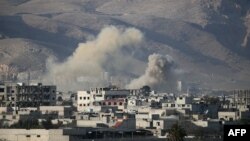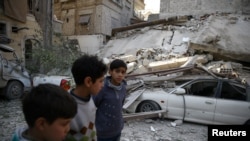Syrian President Bashar al-Assad vowed Sunday that his military's offensive against rebels in the Damascus suburb of east Ghouta will continue, even while U.S. and British leaders accuse him of creating a humanitarian disaster.
"The operation against terrorism must continue, while at the same time, civilians will continue to have the possibility" to evacuate from the war zone, Assad told journalists in remarks aired on state television.
"There is no contradiction between a truce and combat operations," he said. "The progress achieved yesterday and the day before in Ghouta by the Syrian Arab Army was made during this truce."
Assad used the word "terrorists" to refer to the rebels trying to topple him.
U.S. President Donald Trump and British Prime Minister Theresa May agreed Sunday that Russia and Syria are responsible for the "heart-breaking human suffering" in east Ghouta, May's office said.
They discussed in a telephone call what May's office described as the "appalling humanitarian situation," even as the Britain-based Syrian Observatory for Human Rights said Syrian forces have seized on more than a quarter of east Ghouta.
"They agreed it was a humanitarian catastrophe, and that the overwhelming responsibility for the heart-breaking human suffering lay with the Syrian regime and Russia, as the regime's main backer," May's office said.
A White House statement did not mention the phone call. But it did say Russia was ignoring the U.N. Security Council resolution demanding a 30-day cease-fire across Syria. The statement said Russia is killing innocent civilians under the "false auspices of counterterrorism operations."
"This is the same combination of lies and indiscriminate force that Russia and the Syrian regime used to isolate and destroy Aleppo in 2016, where thousands of civilians were killed.," the White House statement said.
More than two weeks of Syrian airstrikes on the rebels, along with artillery fire and rocket attacks, have killed more than 640 civilians.
Although Russia is accused of ignoring the cease-fire that it voted for in the Security Council, it has initiated a daily five-hour "humanitarian pause" for civilians to escape and aid to be delivered. The U.N. said it would deliver 46 truckloads of humanitarian aid to east Ghouta Monday, along with enough food for 27,500 people.
In another phone call, French President Emmanuel Macron urged Iranian President Hassan Rouhani to exert "necessary pressure" on Assad to halt "indiscriminate" attacks on civilians in Ghouta.
Macron's office said Tehran bore "particular responsibility because of its ties to the (Syrian) regime regarding the implementation of the humanitarian truce" sought by the U.N.
"The two presidents expressed their agreement to work together in the coming days along with the U.N., in conjunction with the Damascus regime and the main countries involved in Syria, to secure results on the ground, supply necessary aid to civilians, and implement an effective cease-fire," Macron's office said.
The Syrian Observatory monitoring group said Syrian troops have advanced to within three kilometers of Douma, the main town in Ghouta, retaking "more than 25 percent" of the region.
The Observatory said at least 12 regime fighters were killed in overnight clashes. It said 18 civilians, including three children, were killed in regime bombardment of the region on Saturday.
Kenneth Schwartz contributed to this report.






